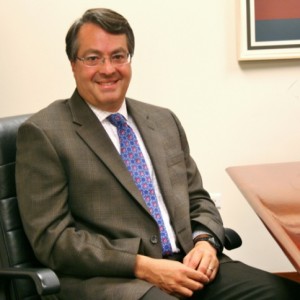
“What we’re trying to do has not been done in the past,” says Jorge Alers. Yesterday, we spoke with Dentons’ first-ever CEO for Latin America and the Caribbean.
by Lauren Biszewski, Esq.
The strong upward momentum of Latin American economies presents public and private companies with tremendous opportunities.
To that end, Dentons is counting on Jorge Alers to lead the way. Alers was appointed Chief Executive Officer for Latin America and the Caribbean in September 2014, marking the global law firm’s focused positioning for presence, client service and growth in the region. In this role, Alers is helping Dentons meet its goal for whole firm combinations in Mexico, Central America, South America and the Caribbean, building on the firm’s current client service reach throughout the region.
GC Grapevine had a chance in August to catch up with Alers for an exclusive interview.
You’ve had a very interesting career so far. Can you fill us in on how you got there?
I joined Dentons as the Chief Executive Officer for Latin America and the Caribbean in 2015, to focus on Dentons’ positioning for presence, client service and growth in the region.
Because of my background, I have many contacts in Latin America and the Caribbean that may be helpful to fulfilling Dentons’ strategy in the region. I was born in Costa Rica and educated in the United States. My J.D. is from Harvard Law School, while my undergraduate degree is from Colorado State University. I have been a guest lecturer at Harvard Law School, Wharton and American University, as well as at numerous conferences on private equity and project finance, among other areas of international finance.
I spent the majority of my career in law firms. I previously was a partner and head of the Latin America Practice Group at Paul, Hastings, Janofsky & Walker, as well as a partner and head of the Latin American Practice Group for Wilmer, Cutler & Pickering in Washington, D.C. In these roles, I focused on providing legal support to international clients making investments in emerging markets, with a particular focus on the Latin American region. I also recently served as the general counsel and general manager of the Legal Department of the Inter-American Development Bank.
Why the move to Dentons?
In 2008, I formally retired from the practice of law and moved with my family to Costa Rica to undertake an entrepreneurial venture. During my residence in Costa Rica, I met Joe Andrew, the Global Chairman of Dentons, and Anne Slaughter Andrew, his wife who was the U.S. ambassador to Costa Rica, and was able to learn more about Dentons and its vision. Eventually, I returned to D.C. to become General Counsel at the Inter-American Development Bank where our friendship continued. I became intrigued by Dentons. The firm’s ambitions and strategy for the global practice of law inspired me and was so attractive that I returned to work for a law firm.
What does your role encompass?
I am charged with helping Dentons to establish a significant physical presence in these important markets. To this end, I explain our goals, vision and strategy with lawyers throughout the region. I enjoy this educational component.
Practically, the people with whom I meet know that Dentons has a unique approach to the practice of law and are anxious to gain a deeper understanding of our vision and strategy. Once explained, they are enthusiastic about our ideas. I also seek to identify potential combination law firms in the region. This requires that I continually analyze the legal market in the region and in each individual country in order to determine which law firms share our vision and are otherwise a good fit for our firm.
What do you enjoy most about your role?
There are many enjoyable aspects to my role. Foremost, I enjoy interacting with the many friends that I have developed in the region during my legal career. I also find it interesting to see how the legal markets in the region have been transformed during the last 30 years, with local lawyers and law firms becoming competitive globally on a quality and cost basis. Finally, it is exciting to be a part of an enterprise that is transforming the legal market place. In a sense, it feels very entrepreneurial.
What is your biggest challenge in this role?
Because Dentons is a newer firm, it is not as well known as others so my challenge is to make sure that the marketplace knows who we are and what we are building. Lawyers are naturally skeptical and good at spotting risk; as such, I frequently am challenged by colleagues in the region about our vision and strategy. I enjoy nevertheless explaining to them this vision and strategy and sharing with them the many successes Dentons has achieved in the short time it has been together.
What qualities/key characteristics do you seek in merger partners?
Unquestionable quality and integrity are the most important factors in identifying a potential combination partner. Fortunately, the quality and sophistication of the legal markets in Latin America and the Caribbean have improved so significantly during the last thirty years that today there are many law firms in the region that are competitive with the most elite firms around the world. In other words, there is no shortage of talented and experienced lawyers in the region.
In addition, we look for law firms that share our vision and strategy. This vision includes several key features. Because of Dentons’ polycentric model, we have no headquarters and no script prepared by headquarters on how to practice law. On the contrary, we believe that our clients demand that their external counsel not only provide them with sophisticated practice and sector experience, but also with experience in how best to do a deal or to resolve a conflict within the unique circumstances and conditions of each jurisdiction.
This is different from other firms that exert more control over their foreign offices in order to ensure that foreign offices do things as they are done in New York or London. Our polycentric model means that Dentons lawyers around the world work together on multi-jurisdictional teams that provide our clients with the practice, sectoral and local experience that are necessary to ensure the best legal support possible.
In addition, Dentons believes that the way lawyers and law firms practice law today is changing dramatically in response to the demands of our clients and as a result of emerging technologies. Dentons wants to lead this change. As a result, our lawyers must be innovators and seek out opportunities to improve the way we provide legal support to our clients.
Finally, potential combination partners must be in and of the community in which they live and practice. This is essential not only to ensure that we can provide our clients with the local knowledge that they demand, but also to ensure that we are a positive force in our communities.
Which of Dentons’ strengths do you believe best attract merger partners; what is Dentons approach?
I believe Dentons’ polycentrism makes us very attractive to potential combination partners in the region. Explicit in this approach is a recognition of how important the lawyers in each office are to our collective success and a respect for the way in which the lawyers in each of our offices are able to provide the highest quality legal support to our clients.
Our position in China due to the recent announcement of our combination with Dacheng also makes us very attractive to firms in the region. No other law firm can offer what we offer in China. Finally, firms are drawn to Dentons because of our leadership with regard to innovation and emerging technologies.
Our size, by itself, provides our lawyers with the ability to access new technologies, such as those related to data protection, at a reasonable cost. More importantly, however, firms recognize the commitment of Dentons to innovation. For example, we have made a substantial investment in Next Law Labs to develop new technologies and products that will fundamentally change the way law is practiced. We look for partners who value this cutting edge service we provide.
How does the recent market instability affect your work in Latin America?
We are building the global law firm of the future. This means we must meet the needs and expectations of our clients around the world today and tomorrow. Our strategy is thus forward thinking and not dependent on short economic cycles.
How do Latin American firms approach business development differently?
Traditionally, elite law firms in Latin America and the Caribbean have emphasized the development of relationships with international law firms, which would refer work to them. Because of increased sophistication and larger in house legal departments of clients together with better access to information, this pattern of referrals is changing. Now, relationships between regional firms and their counterparts in New York and London are less important. As a result, firms are increasingly looking for business development strategies that target clients directly.
Given Dentons’ strong commitment to pro bono work, has any been performed in Latin America?
Consistent with our polycentric approach, each Dentons office plays a significant role in its community. We expect that each office in Latin America and the Caribbean will have its own robust pro bono practice, consistent with the needs and priorities of its own community.
How do you see the Latin American legal landscape developing in the next five to 10 years?
I believe there will be greater integration among Latin American countries, which will lead to greater integration and consolidation among law firms in the region.
What legacy do you hope to leave for the firm?
At Dentons, we believe that we are building the law firm of the future, which is based on polycentrism and innovation. It is exciting to be a part of a vision that is changing the profession of law.







